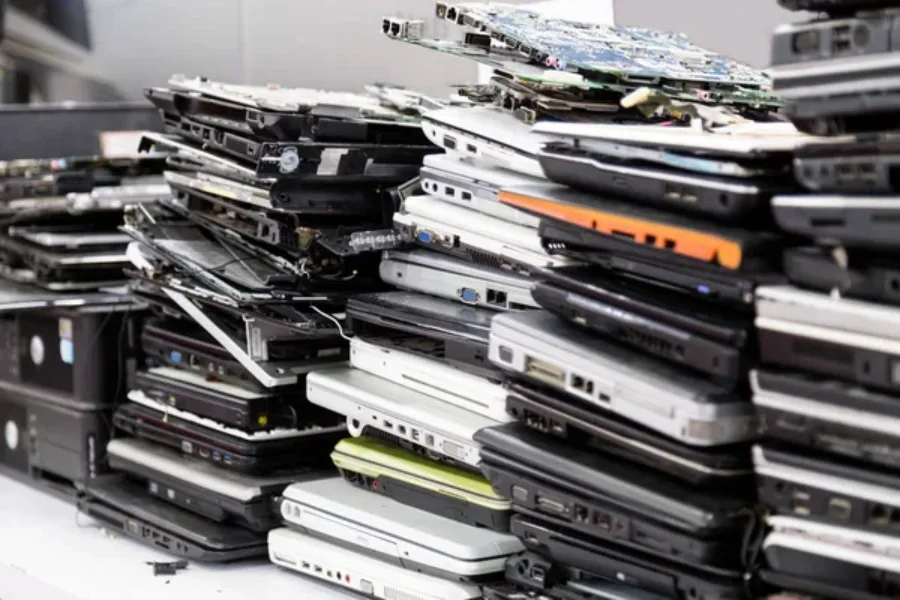Exporting EEE for reuse abroad
You are an exporter of EEE for reuse if you collect EEE on a commercial basis and export it abroad for reuse. Since January 1, 2021, you are legally obliged to register with the National (W)EEE Register (NWR) and to report annually to the NWR the weight you have exported for reuse. More information about this obligation can be found on the website of ILenT (in Dutch).
Why this obligation?
Registration of the export of EEE for reuse is important in order to achieve a comprehensive reporting of production, import and export flows of (W)EEE. This makes it possible to determine the basis for the collection target more accurately. After all, EEE that is exported for reuse is no longer available in the Netherlands for collection and recycling. In addition, better insight into the legal export of EEE makes it easier to monitor and enforce exports of illegal WEEE.

The register promotes the registration of exports for reuse
The register actively contributes to publicizing the obligation. Exporters for reuse can be approached. The Inspectorate for Human Environment and Transport (ILenT) also actively monitors compliance with the obligation.
Every exporter of EEE for reuse is required by law to report the exported weight to the register before 1 May each year for the entire previous year.
If you are already registered as a producer/importer or recycler, you do not need to do anything. You will then be asked each year to supplement your report with the weight of your export for reuse.
Register of exporters of EEE for reuse
No producer? Click here for the other activities
Report missing exporters
If you know an exporter of WEEE that does not appear in the list of registered recyclers, you can report this party to the NWR.
No financial contribution for exporters
As an exporter of EEE, you do not have to contribute to the costs of the register (NWR).
Producers and importers who are the first to market EEE in the Netherlands bear the Producer Responsibility and therefore also the costs incurred by the NWR for registration and reporting.
Frequently asked questions
The website and portal are renewed. Therefore it is for the moment only possible to report for 2022. Data that you have submitted before (2021 and earlier) will be visible soon. You will receive a message if this is possible. If something went wrong or you want to urgently change data, please send us an email.
The website and portal are renewed. Therefore it is for the moment only possible to report for 2021 if you have received an e-mail from us with the link to the reporting form. We will make sure that everyone who has to report for 2021 will receive this invitation as soon as possible and before 15 April 2023.
If you want to cancel your registration, for instance because none of your activities are obliged to register, please contact us by email. Enclose clear arguments to support your request Data that are reported remain content of the register.
Please read the instructions first. If this still gives questions or pain points, contact us by email. Contact by telephone is also an option.
Consult the Handreiking reikwijdte (documents page, in dutch) for this. This is a tool to determine which devices qualify for ‘electrical and electronic equipment’ as referred to in Article 1.f in the WEEE Directive. Some specific devices are covered in Chapter 3 of the European Frequently Asked Questions WEEE Directive.
From August 15, 2018, the changes with regard to the scope of the Regulation AEEA are implemented. Additional products have come under the scope of the Regulation.
Previously, products that do not depend on electricity for their primary function were out of scope of the Regulation AEEA. As of August 15, 2018, all products with an electrical function are in scope, unless the product falls under an exception in the Regulation AEEA.
A producer or importer of electrical and electronic equipment (EEE) must join the Organization for Producer Responsibility for E-waste Netherlands (Stichting OPEN).
Registration with Stichting OPEN implies that the registration at the National (W)EEE Register (NWR) on behalf of this producer is also done by the OPEN.
A foreign producer or importer can authorize a legal entity in the Netherlands to be an authorized representative in accordance with Article 21 of the Regeling AEEA (WEEE Regulation) to fulfill the obligations arising from the regulation on its behalf. This means: carrying out the registration, indicating how he meets his collection obligation and carrying out the annual reporting. From that moment on, the authorized representative is responsible for fulfilling the producer’s obligations. The producer or importer must join Stichting OPEN.
If you are a recycler of waste electrical and electronic equipment (WEEE), you have the following obligations:
– ensure proper treatment of all separately collected WEEE according to the best available techniques. Proper treatment means:
* compliance with seperation requirements for facilities that collect/recycle (Annex VII of the WEEE Directive)
* achieve recovery targets (Annex V of the WEEE Directive).
* recycle according to the Cenelec standard processing
– report each year before 1 May to the National (W)EEE Register the weight of WEEE recycled by you in the previous calendar year and the targets achieved for (material) reuse and recovery.
From August 15, 2018, the changes with regard to the scope of the Regeling AEEA (WEEE Regulation) are implemented. Additional products are now in scope.
Previously, products that do not depend on electricity for their primary function were out of scope of the Regulation. As of August 15, 2018, all products with an electrical function are in scope, unless the product falls under an exception in the Regulation.
The register (NWR) does not answer questions referring to the content of the legislation, other than this FAQ. The government has a specialised helpdesk for these questions: Helpdesk Afvalbeheer.